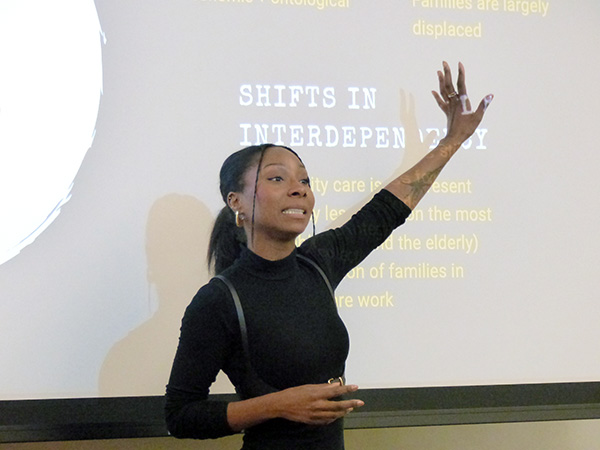Graduate Fellowship Funds and Supports Policy-Focused Research

Sometimes, it just takes a different perspective.
“When you are so rooted in your discipline, you have very particular goals,” said Kayla Thomas, a Yale Ph.D. candidate in sociology. “Hearing from people studying other subjects helps to think about the implications of my work beyond what sociologists often focus on when we talk among ourselves.”
As a graduate policy fellow with the Institution for Social and Policy Studies (ISPS), Thomas received the interdisciplinary feedback she sought and expanded her academic community to learn from a wide variety of approaches to research.
“It helped shift my mindset,” Thomas said. “It allowed me to think beyond how the world is and more about how we might want it to be.”
In addition to sociology, the program’s 2023 cohort includes students pursuing Ph.Ds. in American studies, political science, law, economics, religious studies, history, health policy and management, African American studies, history of science and medicine, and social psychology.
Thomas presented an overview of her ongoing doctoral dissertation research this week on how residents in her home of Crown Heights in Brooklyn, N.Y., manage and navigate ongoing neighborhood phenomena, such as gentrification, policing, and increasing reports of antisemitism and anti-Black racism.
The ISPS program supports students through a $3,000 fellowship and up to $2,500 in research funding. Fellows complete year-long research projects with implications for pressing policy concerns and develop the skills and tools to translate their research findings into policy recommendations. Research projects in the past have included dissertation chapters, scholarly articles, and research papers.
“One value of this program is the ability to share your research and get feedback from other students from a diverse range of departments, helping to develop not just the theoretical framework of your project but an empirical strategy for testing your theory,” said Paul Lendway, a former policy fellow studying political science and current co-coordinator of the program.
In addition, Lendway said the program’s research funding is extremely valuable. For example, when he was an ISPS policy fellow, Lendway used the research funds to launch a large survey experiment that served as the pilot study for the first paper of his dissertation.
Fellows attend biweekly meetings, some featuring prominent Yale faculty and guests working on policy-relevant issues, and others providing training in skills such as op-ed and policy memo writing, media appearances, and blogging. Later in the year, these meetings become opportunities for fellows to present their research and receive feedback from ISPS-affiliated faculty and other graduate fellows. In addition, fellows have the opportunity to work on policy-relevant projects they develop in conjunction with ISPS affiliates.
“I think this fellowship is unique because it’s structured toward supporting the fellows’ needs versus piling on requirements and boxes you need to check,” said Carlo Sariego, a former policy fellow studying sociology and women’s, gender, and sexuality studies and co-coordinator of the current program. “Our goals are to support each other’s research and help translate research into policy-friendly writing.”
ISPS is currently accepting applications for the 2024 calendar year. Applications close December 20.